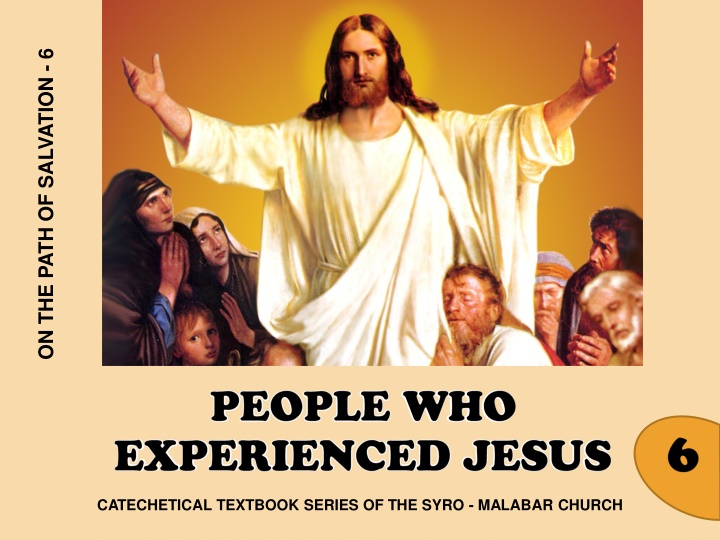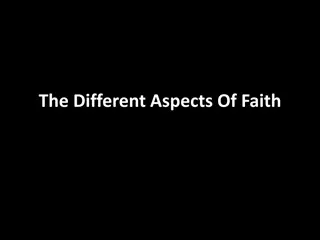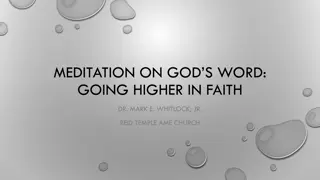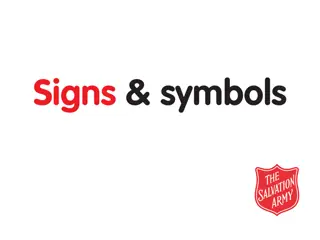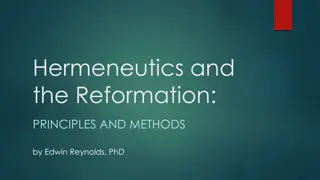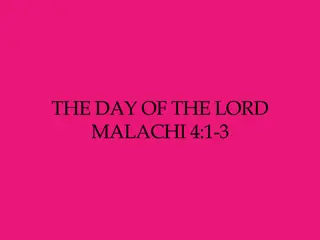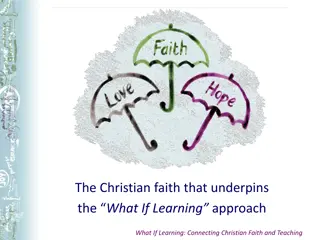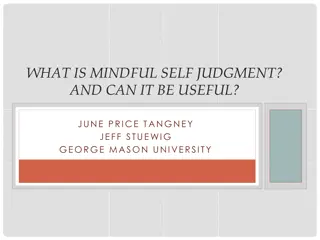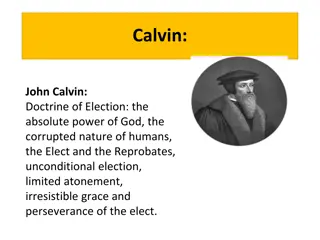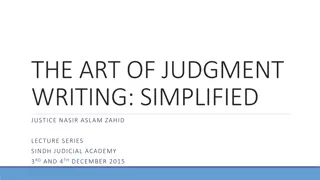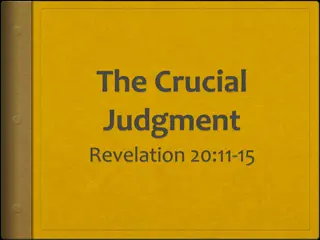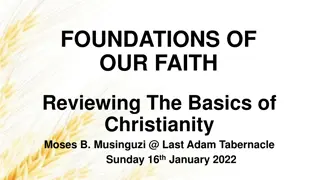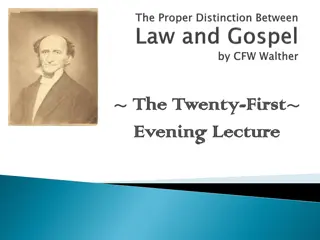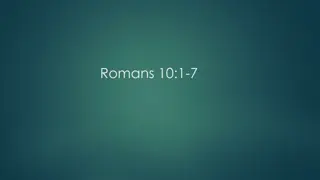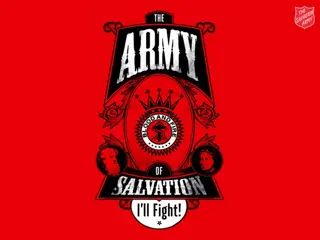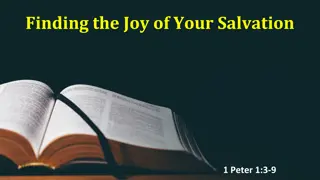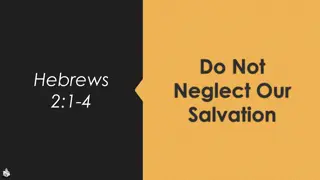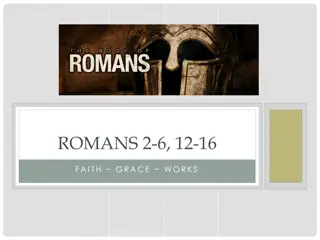Insights on Salvation and Judgment in the Christian Faith
The concept of salvation and judgment in Christianity is explored through biblical references, emphasizing the importance of love, compassion, and good deeds towards others as a reflection of one's faith. The promise of eternal life for the righteous and eternal damnation for the wicked is underscored, reinforcing the belief in a rewarding afterlife based on one's actions.
Download Presentation

Please find below an Image/Link to download the presentation.
The content on the website is provided AS IS for your information and personal use only. It may not be sold, licensed, or shared on other websites without obtaining consent from the author.If you encounter any issues during the download, it is possible that the publisher has removed the file from their server.
You are allowed to download the files provided on this website for personal or commercial use, subject to the condition that they are used lawfully. All files are the property of their respective owners.
The content on the website is provided AS IS for your information and personal use only. It may not be sold, licensed, or shared on other websites without obtaining consent from the author.
E N D
Presentation Transcript
ON THE PATH OF SALVATION - 6 CATECHETICAL TEXTBOOK SERIES OF THE SYRO - MALABAR CHURCH
Jesus who ascended into heaven sits in glory at the right hand of the Father in heaven. He is the lamb who, after gaining victory over sin and death reigns in heaven as a glorious conqueror. Choirs of angels and saints offer worship constantly before this king of kings and chief of chiefs.
there are many dwelling places. And if I go and prepare a place for you, I will come again and take you to myself, so that where I am, there you may be also (Jn. 14: 2- 4). Jesus who is seated at the right hand of the Father assures us that he will come again to take us to heaven. Jesus said, In my father's house disciples, should be where he is. Jesus is coming again to reward each one according to one's actions. The reward for those who do good is eternal life and for those who do evil, eternal damnation. His holy wish is that we, his
When the Son of Man comes with all his angels, in all his glory, he will be seated on his glorious throne. All the peoples will be gathered before him. He will make those who were good, stand on his right and those who were evil, on his left. To those on his right he will say, Come, you that are blessed by my father, inherit the kingdom prepared for you from the foundations of the world; for I was hungry and you gave me to eat, I was thirsty and you gave me to drink, I was a stranger and you welcomed me, I was naked and you gave me clothing, I was sick and you took care of me, I was in prison and you visited me. Then the righteous will answer him, Lord when was it that we saw you hungry and gave you food, or thirsty and gave you something to drink? And when was it that we saw you a stranger and welcomed you, or naked and gave you clothing? And when was it that we saw you sick or in prison and visited you? And the king will answer them, Truly I tell you, just as you did it to one of the least of these who are members of my family, you did it to me (Mt. 25: 31- 40).
'Then he will say to those at his left hand, You that are accursed, depart from me into the eternal fire prepared for the devil and his messengers; for I was hungry and you gave me no food As you did not do it to one of the least of these, you did not do it to me. And these will go away into eternal punishment, but the righteous into eternal life' (Mt. 25: 41- 46). Whether we get reward or punishment at the last judgment is determined on the basis of brotherly love. and the evil against others will be considered as evil done to Jesus. It is our deeds that bring us salvation or damnation. Bliss of heaven awaits those do good while torment of eternal fire awaits those who do evil. The good we do to others will be considered as being done to Jesus doing the good that you should do is also punishable. St. John the apostle says, Those who do not love a brother or also punishable. St. John the apostle says, Those who do not love a brother or sister whom they have seen, cannot love God whom they have not seen (1 Jn. 4: 20). These sacred words teach us that it is not enough not to do evil; but not
During this period we reflect on the glorious second coming of Christ and the victory of the cross. The transfiguration of Jesus reveals to us the spirit of this season. Elijah and Moses are the two prophets who appeared with the glorified Jesus during the transfiguration. Moses represents the law while Elijah, the prophets. What the disciples got on mount Tabor was a preview of the second coming of Jesus who, with his New Testament of Love, completed the Old Testament and who fulfilled the prophecies. This season helps us to reflect upon certain realities like end of the world, death, and judgment and to be prepared for the second coming of Christ with a repentant heart.
Exaltation of the Cross is the main feast of this season of Elijah-Cross- Moses. The Church celebrates this feast on 14 September. This feast is associated with the incident where Queen Helena, mother of Emperor Constantine, discovered the cross of Jesus. Since early times of the Church there was a belief that a glorious cross will be the sign of the Son of Man appearing in heaven on his second coming.
Revelation is the last book of the New Testament. The author of this book is St John, the apostle. This was written while he was in the island of Patmos. This book teaches us that, When Christ appears at the end of the world the evil-doers shall be destroyed while his followers who do good shall enter with him into the new world of glory.
This is the last period in our liturgical year. There are four weeks in this. At the start of this season we dwell upon Christ offering his bride, the Church, to his father after the last judgment. At the end of times, the church, with her his father after the last judgment. At the end of times, the church, with her children meets her bridegroom in the bridal chamber of the heavenly Jerusalem. This is a preview of the eternal bliss that awaits us. The sanctuary (madbaha) is symbol of heaven and the altar stands for the throne of God. On this altar the Word of God is enthroned symbolizing Christ the Word -, who is seated in glory at the right hand of the father. When the priest celebrating the holy Mass approaches the altar, he kisses it in the middle, then on the right and then on the left. By this he is worshipping the Holy Trinity. last judgment, the liturgical year reminds us that we, Christians have been called to reach heaven through the Church. Starting with the birth of Jesus and ending in the glory of heaven after the
The Church, a pilgrim with heaven as destination, attains that goal through a pilgrimage through the liturgical year, starting with the season of annunciation and ending with the season of the dedication of Church sanctification, experiencing and participating in the Christ mysteries. Our liturgy also makes the salvific experience accessible to us. The liturgical year helps us to reach the joy of heaven by gaining strength from the holy Mass and leading a life of selfless love and of sharing.
O! Jesus, our resurrection and hope, bless us to be at your right side on your second coming.
'Truly I tell You, just as you did it to one of the least of these who are members of my family, you did it to me' (Mt. 25:40).
Please write in the following chart the things done by those who are at the right side of Jesus as it is mentioned in the statements of the last Judgements. Statements I was hungry , you gave me to eat
1. Why will Jesus come a second time? 2. What blessing will Jesus give to the people on his right at the last judgment? 3. On what basis will we receive the eternal life or damnation at the time of the final judgment? 4. What is the important feast in the seasons of Elia-Sleeva- Moosa? 5. What does the season of Pallikudassa remind us?
